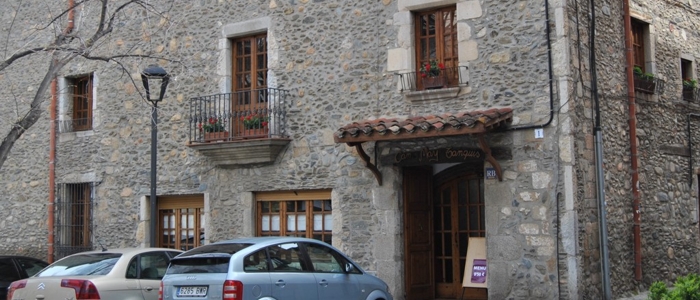
You are now in Bestiar square.
A few metres further on, in the section of Major street that goes from this square to Josep Alfaras square, you will find the oldest part of the village, known as Barri de la Força (Força quarter), the medieval walled centre, made to protect the group of houses around the chapel of Sant Celdoni, next to the road.
La Força had two gateways, Major or Barcelona, that opened onto this square and of which you can clearly see some remains in the corner of Can Mai Tanquis and Major street and Sants Metges, leading to Girona, where there was a chapel to venerate these saints.
The wall is currently mainly hidden by houses which used it as the rear part or enclosure and even as a façade, such as Can Mai Tanquis, number 1 in the square.
Major street confined within the medieval Força includes different 15th and 17th century houses, a testimony of a favourable economic moment which will lead to many inhabitants of Sant Celoni renewing their homes and decorating them with carved stone doorways and windows to display their prosperity. Some of these decorations are still visible today, such as the anvil of the blacksmith who lived in number 161 of Major street, after Bestiar square.
The first news of the wall refers to the gateway to the town of Sant Celoni and dates back to 1154. Important reforms were made in the last quarter of the 14th century. Between 1462 and 1472, during the revolt of the Remences and the Civil War, the wall was reinforced and the moat was filled with water.
Later, when they were no longer useful, houses were built in this place and the Força was hidden. La Força has been listed as a Cultural Heritage of National Interest.
From this point, you can see the famous Can Fabes restaurant, in Sant Joan street, founded by the late chef Santi Santamaria in 1981 and which was the first Catalan restaurant awarded with 3 Michelin stars, it was closed in 2013.
Continuing on the route, you can walk along Major street until you arrive at Josep Alfaras square.
